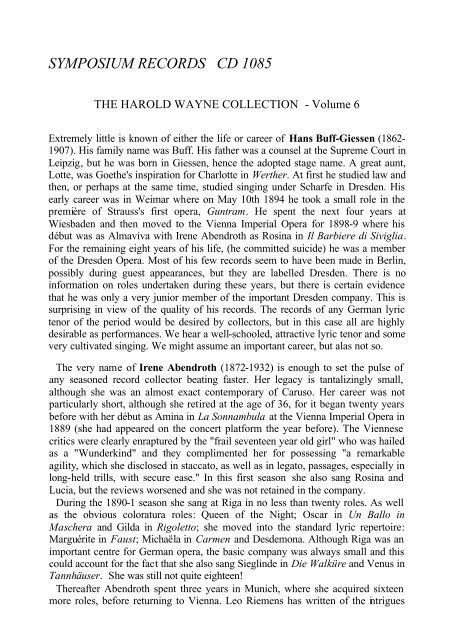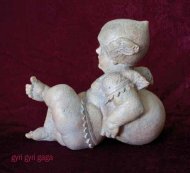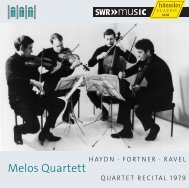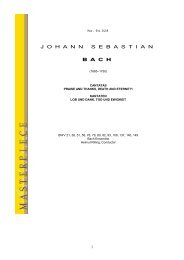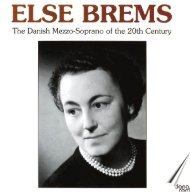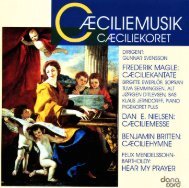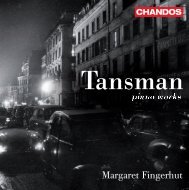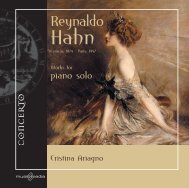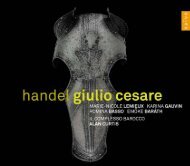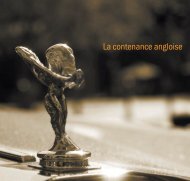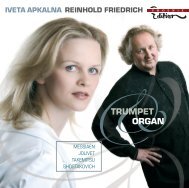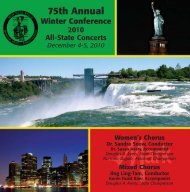SYMPOSIUM RECORDS CD 1085 - Naxos Music Library
SYMPOSIUM RECORDS CD 1085 - Naxos Music Library
SYMPOSIUM RECORDS CD 1085 - Naxos Music Library
You also want an ePaper? Increase the reach of your titles
YUMPU automatically turns print PDFs into web optimized ePapers that Google loves.
<strong>SYMPOSIUM</strong> <strong>RECORDS</strong> <strong>CD</strong> <strong>1085</strong><br />
THE HAROLD WAYNE COLLECTION - Volume 6<br />
Extremely little is known of either the life or career of Hans Buff-Giessen (1862-<br />
1907). His family name was Buff. His father was a counsel at the Supreme Court in<br />
Leipzig, but he was born in Giessen, hence the adopted stage name. A great aunt,<br />
Lotte, was Goethe's inspiration for Charlotte in Werther. At first he studied law and<br />
then, or perhaps at the same time, studied singing under Scharfe in Dresden. His<br />
early career was in Weimar where on May 10th 1894 he took a small role in the<br />
première of Strauss's first opera, Guntram. He spent the next four years at<br />
Wiesbaden and then moved to the Vienna Imperial Opera for 1898-9 where his<br />
début was as Almaviva with Irene Abendroth as Rosina in Il Barbiere di Siviglia.<br />
For the remaining eight years of his life, (he committed suicide) he was a member<br />
of the Dresden Opera. Most of his few records seem to have been made in Berlin,<br />
possibly during guest appearances, but they are labelled Dresden. There is no<br />
information on roles undertaken during these years, but there is certain evidence<br />
that he was only a very junior member of the important Dresden company. This is<br />
surprising in view of the quality of his records. The records of any German lyric<br />
tenor of the period would be desired by collectors, but in this case all are highly<br />
desirable as performances. We hear a well-schooled, attractive lyric tenor and some<br />
very cultivated singing. We might assume an important career, but alas not so.<br />
The very name of Irene Abendroth (1872-1932) is enough to set the pulse of<br />
any seasoned record collector beating faster. Her legacy is tantalizingly small,<br />
although she was an almost exact contemporary of Caruso. Her career was not<br />
particularly short, although she retired at the age of 36, for it began twenty years<br />
before with her début as Amina in La Sonnambula at the Vienna Imperial Opera in<br />
1889 (she had appeared on the concert platform the year before). The Viennese<br />
critics were clearly enraptured by the "frail seventeen year old girl" who was hailed<br />
as a "Wunderkind" and they complimented her for possessing "a remarkable<br />
agility, which she disclosed in staccato, as well as in legato, passages, especially in<br />
long-held trills, with secure ease." In this first season she also sang Rosina and<br />
Lucia, but the reviews worsened and she was not retained in the company.<br />
During the 1890-1 season she sang at Riga in no less than twenty roles. As well<br />
as the obvious coloratura roles: Queen of the Night; Oscar in Un Ballo in<br />
Maschera and Gilda in Rigoletto; she moved into the standard lyric repertoire:<br />
Marguérite in Faust; Michaëla in Carmen and Desdemona. Although Riga was an<br />
important centre for German opera, the basic company was always small and this<br />
could account for the fact that she also sang Sieglinde in Die Walküre and Venus in<br />
Tannhäuser. She was still not quite eighteen!<br />
Thereafter Abendroth spent three years in Munich, where she acquired sixteen<br />
more roles, before returning to Vienna. Leo Riemens has written of the intrigues
then current at that opera. The clique was powerful and the leading singers all had<br />
their dedicated supporters.<br />
For whatever reason Abendroth clearly had only limited success during these five<br />
years in Vienna. Her first role was as Leonora in Il Trovatore, immediately putting<br />
her into competition with Toni Schläger. Up to the time of Mahler's arrival she<br />
seems to have been confined to coloratura and soubrette roles, a fact much<br />
bemoaned by the contemporary Viennese operatic historian, Julius Stern who felt<br />
that the management of the house had simply failed to recognize the extent to<br />
which the artist's capacity had moved way beyond her original repertoire. In<br />
retrospect her most fascinating performance from this period may have been as<br />
Adalgisa in Norma with the peerless Lilli Lehmann in the title part. Abendroth's<br />
roles seem to have improved with the arrival of Mahler, but there is little evidence<br />
that he tried over hard to retain her services when in 1900, she moved to Dresden.<br />
It is Abendroth's eight years at Dresden which secure her place in operatic history<br />
as an outstanding member of one of the great companies of the time. Her début<br />
was as the Queen in Les Huguenots. As well as her established roles, she sang<br />
Tosca (first performance in German; Scheidemantel was the Scarpia), Norma,<br />
Amelia in Un Ballo in Maschera and, incredibly, Giulietta in Les Contes<br />
d’Hoffman. The lucky poet sung by Heinrich Hensel could choose between<br />
Abendroth, Wedekind and Nast. By the time her career ended in 1908 she had over<br />
70 roles in her repertoire. After 1908 she appeared occasionally on the concert<br />
platform and she also taught. She was married to an Austrian railway director.<br />
The name of Anna Bahr-Mildenburg (1872-1947) is indelibly linked with that<br />
of Gustav Mahler. She was the daughter of an Austrian major and seems already to<br />
have been aged 19 when her vocal talent was first 'spotted'. She then commenced<br />
study with Rosa Papier-Paumgartner. In 1895 she went with her teacher for an<br />
audition with Pollini at Hamburg. She proceeded to sing the main arias from<br />
Oberon, Don Giovanni and Die Zauberflöte. The bravura performance was<br />
rounded off with Ortrud's curse and Brünnhilde's cry. She was immediately<br />
engaged and asked to study for a début as Brünnhilde in Die Walküre. It was<br />
during rehearsals that she first met Gustav Mahler who simply took over the<br />
training and direction of her artistic progress. Her début was a triumph and whilst<br />
only in her mid-twenties besides other major Wagnerian roles (including Kundry<br />
at Bayreuth in 1897) she also sang Rezia in Oberon, Donna Anna, Norma and<br />
Leonora in Fidelio.<br />
The artistic partnership was matched by a passionate, but relatively brief love<br />
affair. By 1897 Mahler had become music director of the Vienna Imperial Opera,<br />
but there is little evidence that this was the reason for Mildenburg's engagement<br />
there the following year. Much more important was Rosa Papier's continuing<br />
concern for her protégée. She seems also to have given clear advice to the<br />
erstwhile lovers as to the basis for the resumed artistic partnership.<br />
Mildenburg was to remain with the Vienna Opera as a regular member of the<br />
company for nearly twenty years, until 1917, and subsequently made further guest<br />
appearances until 1921. Her greatest years were from 1900 to 1914. She sang
Isolde and Elizabeth at Covent Garden in 1906 and four years later appeared in the<br />
first London performance of Elektra under the baton of Thomas Beecham. She<br />
appeared again at Bayreuth in 1909 as Ortrud and at three subsequent festivals as<br />
Kundry.<br />
In later life Mildenburg was stage director at Augsburg (where she also sang her<br />
final performance as Klytamnestra in Elektra in 1930), a teacher and an author -<br />
not just of her memoirs, but also a fascinating stage book for Tristan und Isolde.<br />
She was married to the novelist Hermann Bahr. Her only known recording was<br />
made in 1904, a mere fragment of recitative from Oberon. If, though, her singing<br />
twenty years prior had been anywhere remotely comparable, it is hardly surprising<br />
that Pollini offered her a contract so promptly. The fire and drama of her<br />
temperament are manifest through a splendidly trained, powerful and rock-steady<br />
voice. The impact is immediate and memorable.<br />
The career of Toni Schläger (Antonia Lautenschläger) (1860-1910) seems to<br />
have been confined entirely to Vienna where, along with Amalie Materna and<br />
Marie Wilt, she was regarded as one of the outstanding dramatic sopranos of the<br />
last quarter of the nineteenth century. Like many others she started her career in<br />
operetta, making her début when only nineteen at the Carl-Theater. In three years<br />
she sang a considerable number of roles, enjoying the greatest success before<br />
moving to the State Opera where she made her début as Valentine in Les<br />
Huguenots. Interestingly this was also, little more than fourteen years later, her<br />
farewell role. In between she gave, incredibly, more than 640 performances in a<br />
huge variety of roles - Alice in Robert le Diable; Leonora in Fidelio; Selika in<br />
L'Africaine; Desdemona in Otello. She was the first to sing Santuzza in Vienna and<br />
Brünnhilde in the Ring, and even more surprisingly Ortrud in Lohengrin. In this<br />
role, according to Hugo Wolf, she was particularly effective "thanks to her colossal<br />
voice"!<br />
According to another critic: "The satisfying, luxuriant sound of her powerful<br />
voice, the great dramatic power of her performance, must remain unforgettable to<br />
anyone who has heard her even once."<br />
It is a view we can begin to echo on hearing what is probably the only copy of her<br />
only record. It was made some years after she had left the opera stage, although she<br />
continued to give concerts before retiring to married life in Lower Austria. In<br />
common with several of the artists on this disc, the recorded evidence, brief though<br />
it is, leaves no doubt of her dramatic stature and vocal ability.<br />
Although Marianne Brandt (Marie Bischof) (1842-1921) was a close<br />
contemporary of both Lilli Lehmann and Adelina Patti, her recorded legacy is<br />
much smaller, consisting of just three brief cylinders recorded by Artistikel<br />
Records some fifteen years after her retirement from the operatic stage. She made<br />
her début at Olmutz as Rachel in La Juive after studies in Vienna with Zeller and<br />
Marschner. In 1869 and 1870 she studied further with Pauline Viardot in Baden-<br />
Baden. At her peak in the 1870s and 1880s she was undoubtedly one of the operatic<br />
giants. Herman Klein drew attention to the difficulty of classifying her voice. The
Berlin Hofoper designated her a contralto, but she also sang Leonora in Fidelio and<br />
Donna Elvira, clearly soprano roles, but she was one of the greatest Kundrys and<br />
Brangänes of the day, clearly mezzo territory. Other roles included Fides in Le<br />
Prophète, Valentine in Les Huguenots, Erda in the Ring and, amazingly, the small<br />
lyrical- even coloratura - role of Astaroth in Goldmark's Die Königin von Saba.<br />
Perhaps the epithet 'soprano assoluta' would be deserved and indeed contemporary<br />
critics saw her as a rival to Lehmann.<br />
Brandt's home base was Berlin, she was a member of the company from 1868 to<br />
1886, but she enjoyed a much more truly international career than the other singers<br />
in this compendium. She appeared at Covent Garden and Drury Lane in London, as<br />
a frequent guest in Vienna, at festivals in Bayreuth and at the Metropolitan Opera<br />
in New York during the height of the German opera domination of the 1880s.<br />
She first appeared in London (1872) in Fidelio and followed this up with Donna<br />
Elvira in Don Giovanni; her impact on this occasion lessened by the inclusion in<br />
the cast of both Patti and Maurel. Ten years later she appeared at Drury Lane in<br />
what must have been one of London's operatic nights of the century, the first<br />
performance in that city of Tristan und Isolde. Conducted by Richter, the cast<br />
included Winkelmann and Sucher in the title roles and Brandt herself as Brangäne.<br />
Her first Bayreuth appearance was as Waltrante in the first performance of Die<br />
Götterdämmerung (1876). She, Malten and Materna shared the first performances<br />
of Kundry in Parsifal (l882) ..<br />
Brandt scored a series of spectacular triumphs at the Metropolitan Opera. Of her<br />
début there in 1884 in Fidelio one critic wrote, "her voice is brilliant and powerful<br />
... as an actress she is intelligent, impassioned and forceful". Another seems almost<br />
carried away with hyperbole: "the artistic stature of this woman is too great to<br />
permit a thought of her performance being reviewed in the fugitive minutes which<br />
are at our command: we wish to record only our conviction of the depth of her<br />
genius as a dramatic singer". To Henry Finck her emotional grandeur in this role<br />
was unsurpassed; her Ortrud was the most thrilling; her Fides unequalled; and she<br />
was the very personification of Erda.<br />
In retrospect it seems strange that these Metropolitan seasons marked the<br />
virtual end of Brandt's operatic career, especially as it had started relatively late.<br />
From 1890 she taught in Vienna and appeared sometimes in concerts. Possibly the<br />
vast range of roles and the heavy repertoire took their toll. Nevertheless at 63 what<br />
remains, perhaps aided by rest, is remarkable.<br />
Gustav Walter (1834-1910) is one of the earliest singers to have recorded,<br />
being born just a few days before Charles Santley. His first studies were of the<br />
violin and in chemistry before training as a singer under Schubert's friend Vogl. His<br />
debut was as Edgardo in Lucia di Lammermoor in Brno in 1855, but the following<br />
year he commenced a thirty year association with the Vienna Imperial Opera,<br />
starting with the role of Gomez in Der Nachtlager von Granada and making his<br />
stage farewell as Wilhelm Meister in Mignon in 1887. His career was mainly in the<br />
light lyrical roles and contemporary critics speak of his small, sweet voice. This is<br />
certainly evident in his small recorded legacy which includes an aria from Mignon.
The high point of Walter's operatic career was the creation of the role of Assad in<br />
the world premiere of Goldmark's Die Königin von Saba with a cast including<br />
Amalie Materna and Marie Wilt in 1875.<br />
As his operatic career unfolded Walter developed a second career as a concert<br />
singer. In 1872 he appeared at a Philharmonic Society concert in London together<br />
with Carlotta Patti. His contributions were Tamino's aria from Die Zauberflöte and<br />
songs by Rubinstein and Riedel. After his retirement from the operatic stage Walter<br />
continued for many years to appear in concerts. It is claimed that he was the first<br />
singer to present a solo Lieder recital. He was also a noted teacher of singing, and<br />
his children Minna and Raoul were also singers.<br />
Sophie Sedlmair (1857-1937) Details of this artist are to be found in Volume<br />
V of The Harold Wayne Collection.<br />
Karl Scheidemantel (1859-1923) began his career when aged only 19 at<br />
Weimar, singing Wolfram in Tannhäuser. He stayed with this company until 1886<br />
although during this time he continued studying with Julius Stockhausen. During<br />
the early 1880s he made various guest appearances throughout Germany, most<br />
significantly at Dresden in 1885. Meanwhile he appeared at Covent Garden,<br />
including a single performance as Kurwenal in Tristan und Isolde. The Isolde, Lilli<br />
Lehmann, declared that in this role Scheidemantel "impressed me especially".<br />
During the same season the press enthused over his Wolfram, especially the<br />
"Abendstern" aria whilst a fellow singer David Bispham commented on his "noble<br />
Hans Sachs" in Die Meistersinger.<br />
Scheidemantel first appeared at Bayreuth in 1886 returning in 1888, 1891,<br />
1892 and 1894. His roles were Kurwenal, Wolfram, Hans Sachs and both Klingsor<br />
and Amfortas in Parsifal. In the same year as his first Bayreuth performances he<br />
joined the Dresden company, remaining a member for twenty five years and<br />
singing a great variety of roles. There he sang in the first performance of Feuersnot<br />
in 1901 and in his very last season he was Faninal in the world première of Der<br />
Rosenkavalier with Siems as the Marschallin. He seems to have sung for only one<br />
season in Vienna in 1890 when apart from the inevitable Wolfram and Hans Sachs<br />
he also appeared in Marschner's Hans Heiling, Herold's Zampa and in Un Ballo in<br />
Maschera.<br />
Confirmation of Scheidemantel's international status comes with his<br />
appearances at La Scala as Wolfram. The differing worlds of German and Italian<br />
opera are evidenced by the fact that December 29th 1891 marked the first<br />
performance at La Scala of any Wagnerian opera.<br />
It is not clear in which language the performances were given, for the stellar<br />
cast included Darclée, Arkel and de Negri. Even so the lengthy review in the<br />
Gazetta <strong>Music</strong>ale di Milano gives pride of place to Scheidemantel, "a perfect voice<br />
throughout its range, noble and dignified acting, and artistic interpretation". It is<br />
perhaps a neat little postscript to this Italian excursion that around this time<br />
Scheidemantel appeared, presumably in Dresden, as Alfio in Cavalleria Rusticana.<br />
At the end of his long career Scheidemantel taught singing, wrote on the
subject and even turned his hand to opera production. Alas he left but a handful of<br />
records.<br />
Lola Beeth (1860-1940) is yet another noteworthy heroine of the Viennese<br />
operatic stage. Her period of study was international in scope: with Dustmann in<br />
Vienna, Viardot in Paris, Lamperti in Milan and Deruda in Berlin. She made a<br />
sensational début at the Berlin State Opera in 1882 as Elsa in Lohengrin and she<br />
remained there until 1888 before being 'captured' for Vienna. There she was to<br />
enjoy her greatest successes in a wide variety of roles including: Juliette, Frau Fluth<br />
in the Die Lustige Weibe von Windsor, Sieglinde, Eva and Elsa, Rachel in La Juive,<br />
in lesser known operas too, such as L'Amico Fritz, Der Trompeter von Säckingen,<br />
and Merlin. She left the Vienna company in 1895, presumably for the international<br />
circuit, appearing at Covent Garden and the Metropolitan Opera as well as in Paris,<br />
St. Petersburg and Moscow. Her success, at least in the English speaking countries,<br />
was clearly limited. Klein thought her past her best, but she also may have had<br />
language problems; at Covent Garden she was required to sing Sieglinde in French<br />
and at the Metropolitan, Eva in Italian. Allegedly, she appeared at the latter house<br />
as Valentine in Les Huguenots with Jean de Reszke. If she did, it could have been<br />
only as a last minute replacement for Nordica. Perhaps it is not surprising that<br />
Beeth became a member of the Vienna company again in 1898 remaining until<br />
1901, although with less impact than previously. Thereafter her career seems to<br />
have simply petered out apart from a re-appearance in Monte Carlo, where she had<br />
been well received in the mid-1890s. In 1903 she returned to sing a 'delightful'<br />
Michaëla in Carmen.<br />
Stanley Henig ©1990<br />
Dr. Wayne writes:<br />
Buff-Giessen. Much of Dresden was burned to the ground during World War II.<br />
Thus some of the finest collections containing examples of records made by<br />
Dresden-based singers were lost. The extreme rarity of the Buff-Giessen records<br />
thus applies also to Abendroth, Scheidemantel and others.<br />
3-42701 was issued coupled with 3-42324, “Weisse Dame” and “Mignon”, I have<br />
seen twice, the remaining titles but once each. All came from Viennese collections,<br />
apart from the single-sided "Traviata" 3-42679, which was in the collection of<br />
Ronald Phillips until 1969; this, in particular, is a most delightful record. There<br />
were also single representative items in both the Bauer and Dick Alexander<br />
collections. We are very much indebted to Leo Riemens and Professor Wilhelm,<br />
who did much to gather and save most of the extant specimens of these Dresden<br />
singers.<br />
Abendroth sang mainly in Dresden, but also in Vienna and Munich. The 7" titles<br />
eluded me. Once when I was in Munich in 1966, I tried to persuade Wilhelm<br />
Wimmer to release his copy of 43038 "Vergebliches Ständchen", but to no avail.<br />
Otherwise, I found only 4 10" titles. All are rare, but I have managed to find 2
copies of 43243 "Troubadour", one came from Otto Müller in 1968, and the other<br />
from Roland Teuchtler in 1973. There was a lovely pressing of this, by no means<br />
the rarest of the group, in the Sharples collection. 43244 "Semiramis" I have found<br />
three times. 43245 "Mignon" was also represented in the Sharples twins' holding,<br />
a beautifully preserved specimen as I recall. 43247 is not, to my knowledge,<br />
known to exist, but may possibly have been found since I stopped collecting in<br />
1974. 43248 and 43249 I have never seen, but believe to be extant in Yale<br />
University <strong>Library</strong> and probably in Germany too. 43250 "Barbiere" is the only title<br />
I have noted to have reached a second master, and in this form it is backed with<br />
Minnie Nast 43679 "Figaro". Despite this fact it also is very rare indeed.<br />
Von Bahr-Mildenburg 43630. This, the only known recording by this famed<br />
soprano, was discovered in the 1950's in three identical Gramophone & Typewriter<br />
pressings, in the possession of the Mildenburg family; they were acquired by a<br />
certain Physician and taken thence to the International Record Collectors Agency,<br />
where for a time they were all in the hands of Colin Shreve. Eventually, copies<br />
went respectively to Keating (and thence to Larry Witten and Yale), to Dick<br />
Alexander, and to Roberto Bauer. Both Bauer's and Alexander's eventually came<br />
into my possession. Other titles have been rumoured.<br />
Antoine Schläger was not generally known to have recorded until Bennett &<br />
Wimmer's German catalogue was published in 1967. Otto Müller described her as<br />
the idol of Viennese audiences, beautiful but obese in the 1880s, but that by the end<br />
of the '90s she had become so tremendously overweight that she could no longer<br />
continue her wonderful career. This record came to me by way of exchange for<br />
Gustav Walter's "Am Meer", of which I then had a duplicate copy. The source of<br />
my copy was, amazingly, Australia, in 1973. The voice is very backward at the<br />
beginning of the music so that the record must have been withdrawn almost<br />
immediately. A remarkable voice.<br />
Brandt is known to discophiles only from her incredibly rare Pathés. Mine came<br />
from a collector in New York City.<br />
Scheidemantel's 1907/8 double-sided discs turn up in Austria and Germany every<br />
now and then but the six Gramophone & Typewriter records are altogether a<br />
different story. I have never heard of a single example of 42750 or 42751, though<br />
no doubt they must exist somewhere, perhaps in Germany. Whilst looking for<br />
Scheidemantel I found and acquired, in Munich, a Geissler, also of Dresden, and<br />
Rudolf Jäger's "Elias". Both copies that I have found of 42843 "Ich liebe dich" are<br />
from the first master of course. I doubt it ever went to a second pressing, but the<br />
labels differ in the type-setting. One was kindly put in my direction by my old<br />
friend John Freestone and the other showed up in Vienna in a bric-a-brac shop.<br />
42844 "Tannhäuser" is my favourite of this group; it resided in Roland Teuchtler's<br />
personal archive. 42870 “Heinrich der Vogler” was originally in Colin Shreve's<br />
private collection. I had one other copy of this title, which I passed on to Anthony<br />
Westbrook in exchange for several Roxy King titles.
Sedlmair 43450 "Ich liebe dich". This ultra-rarity in mint condition was offered to<br />
me by Dick Alexander in 1965. At the time it was thought possibly to be unique.<br />
Bennett & Wimmer supply no details of it in their catalogue of 1967.<br />
Symposium Records is extremely grateful to Professor Stanley Henig for the above<br />
article and to Dr. Paul Lewis for much help and advice in this production.<br />
WARNING: Copyright subsists in all recordings issued under this label. Any<br />
unauthorised broadcasting, public performance, copying or re-recording thereof in<br />
any manner whatsoever will constitute an infringement of such copyright.


